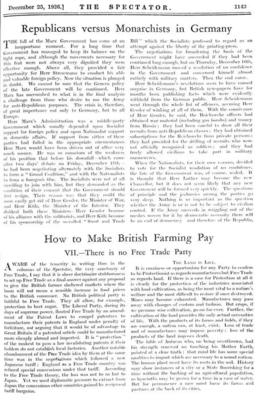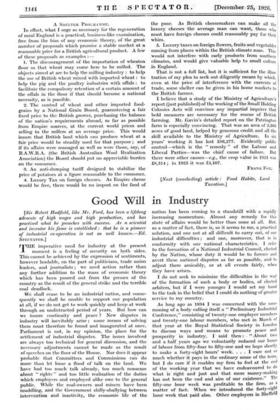How to Make British Farming Pay VII.—There is no Free
Trade Party AWARE of the temerity in writing thus in the columns of the .Speetutor, the very sanctuary of Free Trade, I say that it is sheer doctrinaire stubbornness to set up Free Trade as a final answer against any proposal to give the British farmer sheltered markets where the boon will not mean a sensible increase in food prices to the British consumer. No British political party is faithful to Free Trade. They all allow, for example, protection to beet sugar. The Liberal Party, during its days of supreme power, flouted Free Trade by an amend- ment of the Patent Laws to compel patentees to manufacture their patents in England under penalty of forfeiture, not arguing that it would be of advantage to Great Britain if a patented article could be manufactured more cheaply abroad and imported. It is " protection " of the rankest to pass a law invalidating patents if their holders do .not establish local factories. Another notable abandonment of the Free Trade idea by them at the same time was in the negotiations which followed a new Japanese tariff : England as a Frec Trade country was refused special concessions under that tariff. According to the Free Trade theory, the loss was not to us but to Japan. Yet we used diplomatic pressure to extract from Japan the concessions other countries gained by reciprocal tariff bargains. Tits: LAsD ts LIFE.
It is craziness or opportunism for any Party to confess to be Pmteetionist as regards manufacture but Free Trade as regards land. If there is a ease for Protection at all it is clearly for the protection of the industries associated with hind cultivation, as being the most vital to a nation's welfare and the most difficult to restore if once destroyed. Mines may become exhausted. Manufactures may pass away with changes of custom and fashion. But crops, if we presume wise cultivation, go on for ever. Further, the cultivation of the land provides the only actual necessities of life. With the products of its farms and fields, if they are enough, a nation can, at least, exist. Loss of trade and of manufactures may impose poverty : loss of the products of the land imposes death.
The fable of Astacus who, on being overthrown, had his strength renewed on touching his Mother Earth, pointed at a clear truth : that rural life has some special qualities to impart which are necessary to a sound nation. The human plant must have its roots in the soil. History may show instances of a city or a State flourishing for a time without the hacking of an agricultural population, as hyacinths may be grown for a time in a vase of water. But for permanence a race must have its farms and pastures at the back of its cities. A SHELTER PROGRAMME.
In effect, what I urge as necessary for the regeneration of rural England is a practical, business-like examination, free from the bias of any economic theory, of the great number of proposals which promise a stable market at a reasonable price for a British agricultural product. A few of these proposals as examples :-- 1. The discouragement of the importation of wheaten flour so that wheat may come here to be milled. The objects aimed at are to help the milling industry : to help the use of British wheat mixed with imported wheat : to help the pig and the poultry industries with offals : to facilitate the compulsory retention of a certain amount of the dials in the 'flour if that should become a national necessity, as is possible.
2. The control of wheat and other imported food- grains by a National Grain Board, guaranteeing a fair fixed price to the British grower, purchasing the balance of the nation's requirements abroad, so far as possible from Empire sources, at the current world prices and selling to the millers at an average price. This would insure that British land which can produce wheat at a fair price would be steadily used for that purpose ; and if its affairs were managed as well as were those, say, of B.A.W.R.A. (the British Australian Wool Realization Association) the Board should put no appreciable burden on the consumer.
3. An anti-dumping tariff designed to stabilize the price of potatoes at a figure reasonable to the consumer.
4. Luxury Tax on foreign cheeses. As Empire cheese would be free, there would be no impost on the food of the poor. As British cheesenaakers can make all the luxury cheeses the average man can want, those who must have foreign cheeses could reasonably pay for their whim.
5. Luxury taxes on foreign flowers, fruits and vegetables coming from places within the British climate zone. This would not interfere with early products from southern climates, and would give valuable help to small culture . in England.
That is not a full list, but it is sufficient for the illus. tration of my plea to seek out diligently means by which, .even at the price of interference with the currents of trade, some shelter can be given in his home markets to the British farmer.
I believe that a study of the Ministry of Agriculture's report (just published) of the working of the Small Holding Colonies Acts will convince any impartial inquirer that bold measures are necessary for the rescue of British farming. Mr. Gavin's detailed report on the Patrington farm is especially convincing. That was an area of 2,363 acres of good land, helped by generous credit and all the skill available to the Ministry of Agriculture. In six years' working it has lost £86,277. -Evidently public control—which is the " remedy " of the Labour and Liberal Parties—was the chief cause of failure. But there were other causes—e.g., the crop value in 1921 was 18,514 ; in 1925 it was £4,107.
FRANK Fox.
[Next (concluding) article : Food Habits, Land Taxation.]



































 Previous page
Previous page